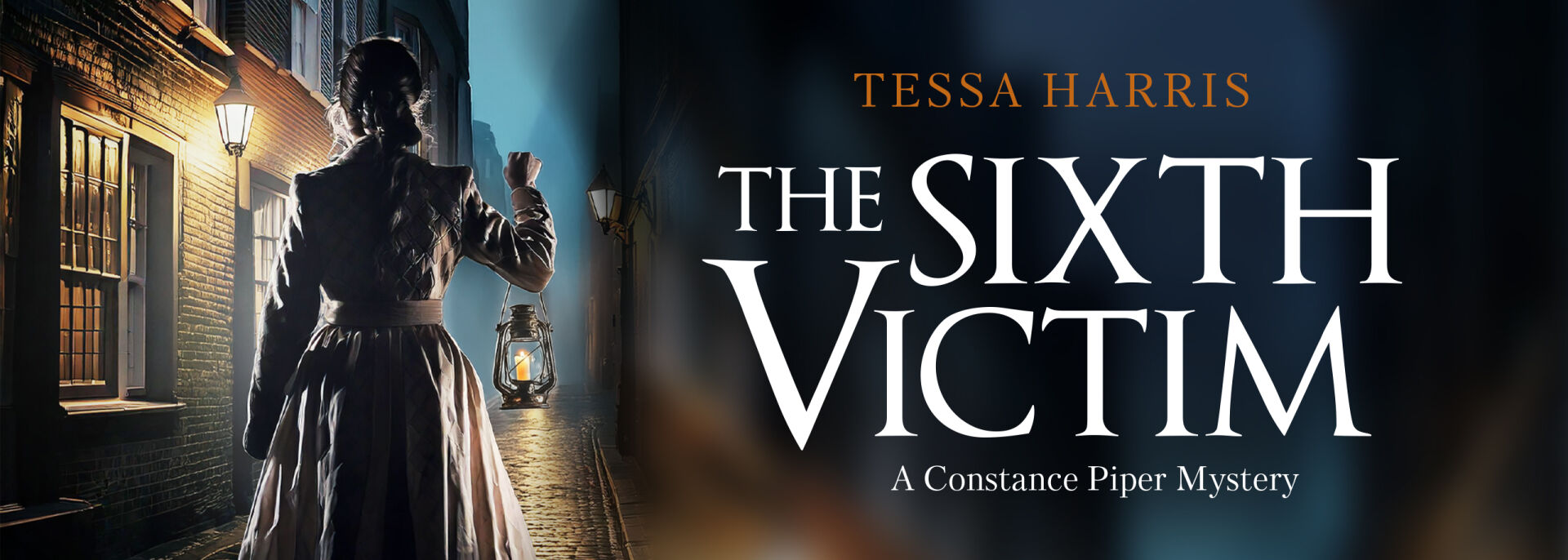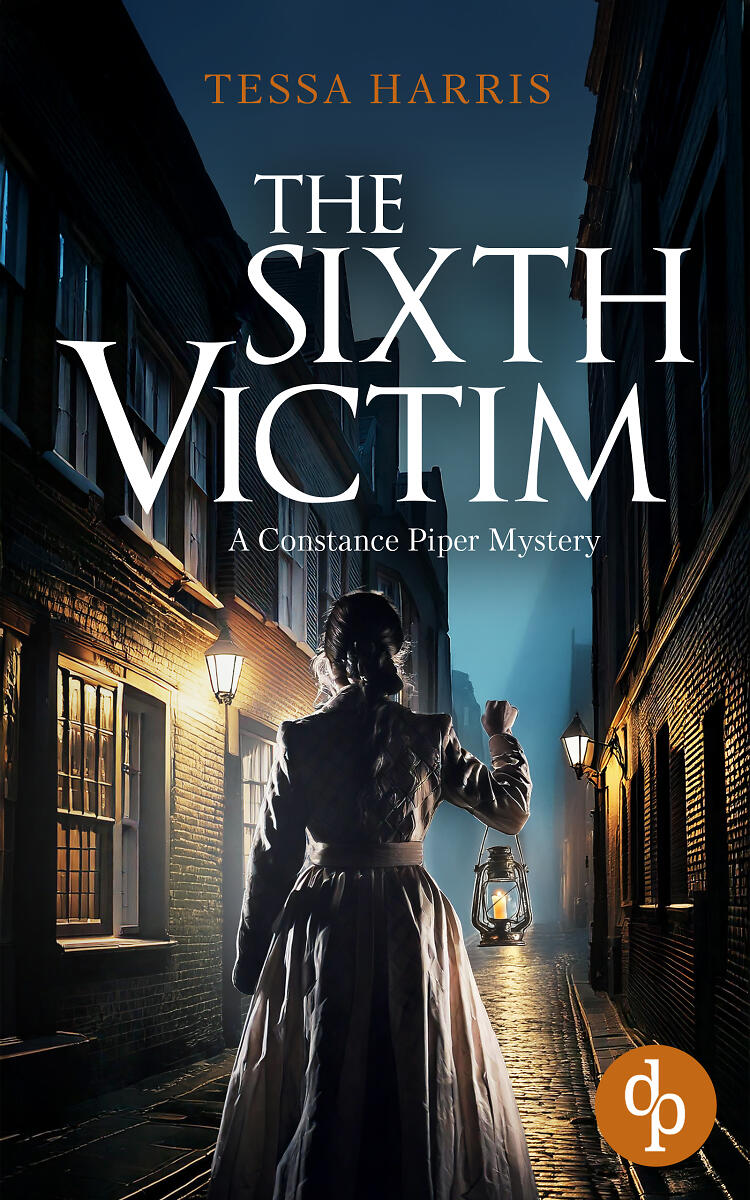CHAPTER 1
CONSTANCE
London, Saturday, September 8, 1888
There’s blood in the air. Again. They’ve got the scent of it in their nostrils and they’re following it, like wolves honing in for the kill. Only the killing’s already done. It’s the third in a month here, in Whitechapel, and the second in little more than a week and everyone’s in a panic. We’re heading toward the scene, to Hanbury Street. There’s a big swell of us and it’s growing every minute as news seeps out. Shopkeepers gawp, arms crossed, on their steps. Barrow boys are spreading the word. Commercial Street’s always busy at this time of the morning, but now the world and his wife seem to be funneling along the rows of old weavers’ houses in Fournier Street.
Near me, a big man shouts over my head to a friend on the opposite side of the road, cupping his hands round his mouth. “By the cat meat shop!” he yells over the traffic’s din. Past the tight-packed rows of dwellings I go, through Princelet Street, until I reach the place. Sure enough, a big cluster has gathered outside Mrs. Hardiman’s Cat Meat Shop. More and more people are pressing around me now, slavering and baying. They’re craning their necks to see. Some men are even hoisting their little ones on their shoulders to get a look. There are a few newspaper hacks here, too, dressed better than the rest of us, all trying to snuffle up the juicy details.
In the crowd, I spot people I know. There’s Widow Gipps and her creepy half-wit son, Abel. I wouldn’t trust him as far as I could throw him. And Bert Quinn, the knife grinder, skin like a roasted chestnut—he’s here, too. And Mrs. Puddiphatt. She lives on our street. Where there’s trouble, there’s Mrs. Puddiphatt. Sniffs it out, she does, with her big nose. There’s Jews, too. Plenty of Jews. They’re selling jellied eels from a barrow like it’s a carnival, not a killing we’ve all come to see. But I’m looking for Flo, my big sister. I lost her somewhere down Wilkes Street. I bet I know where she’s gone. She’s friends with Sally Richardson, whose ma has a lodging house that backs onto Brown’s Lane. She’ll blag a favor and hope to get a good view of the backyard where they say it happened. Them that lives here are charging sixpence a pop, just for a gander. You can’t blame the poor beggars, but you won’t catch Flo parting with her money when she can get a good view for free.
Truth is, I don’t want to see it. The body, I mean. If it’s anything like the last one, I know I’ll want to retch. I read about Polly Nichols in the papers, see. What did the Star say? She was “‘completely disemboweled, with her head nearly gashed from her body.’” What sort of maniac could do such a thing? I ask you. And now this one.
A shout down our street woke us all up this morning, Flo and me and Ma. Dawn it was. Barely light. Nippy too. Flo stuck her head out the window. A moment later, she’s back.
“There’s been another!” she tells me, eyes wide as saucers. So she drags me out of my bed, all bleary, and says we’re going to see what’s what. That’s how it is around here. We look out for each other. Everyone knows everyone’s business in these parts, so when one of your neighbors is murdered, then it’s your business, too. And this, this madman—well, he seems not to care who he picks on as long as they’re on the streets.
Maisie Martin was in the Frying Pan on Brick Lane the other night. Flo told me that her friend had been sleeping with her babes not five yards away from where the fiend did his work on poor Polly. She’d heard a scream, then thuds, like someone was hitting her front door. But she froze. She didn’t even dare to look out the window; she was that scared for her little ’uns. And, well, she might’ve been. They found Poll a few paces away, her throat slit and her guts ripped from her body like tripe on a butcher’s block.
Now there’s four women dead since April and the last two’ve been filleted not three streets away from us. When that happens, then you sits up and takes notice, don’t ya? No one’s been done for them, so he’s still on the prowl. There are suspects, of course. They say a Jew did both of the latest ones. Or that it’s the Fenians, them Irish blokes. After Polly, Old Bill started asking us all questions. Did we see anyone acting funny? Did we know them that was done for? But no one’s behind bars, waiting for the hangman. And I don’t mind telling you, that no woman round Whitechapel feels safe.
Anyway, Hanbury Street and Brick Lane is crawling with coppers. There’s a ring of dark blue round Number 29. They’re telling people to keep back. One or two of the rossers are even waving truncheons about, showing they mean business. There’s an ambulance, too. The horses don’t like the crowd. They’re getting restless.
Rumors are racing round like fleas on a dog’s back.
“It’s Dark Annie,” I hear someone growl.
“Annie Chapman?”
“So they say.”
It’s no one I know. I’m feeling relieved when I hear someone yell my name. “Con!” I switch round. “Con!” It’s Flo, a few feet away from me, standing in a doorway. She beckons me to come quick. I break free from the huddle around me.
“Did you see anything?” I ask, scuttling across the street.
She shakes her head. “All I sees was a pair of laced-up boots and red-and-white–striped stockings. Sticking out of a piece of old sack, they was. Then they came to take her off.” She jerks her head over to the waiting ambulance. Her voice is flat, like she’s missed the star act at a variety show. Then, as if she’s trying to make up for her own disappointment, she adds with a cheery shrug: “I ’eard ’er innards ’ave been ripped out, too.”
I cringe at the thought. “You reckon it’s Leather Apron again?” I ask, but before she can answer, a roar goes up. I wheel round to see the crowd craning and pointing. Old Bill’s telling everyone to move back. They’re sliding the body on a stretcher into the ambulance to carry it off. We watch as they shut the doors and slowly the cart pulls off down the street. It takes a while. There’s idiots who cling onto it. Lads mainly. But a few sharp blows with a copper’s truncheon soon sort out that problem and off the ambulance goes to the mortuary.
“Come on,” says Flo, taking my arm. “We’ve seen all we can, for now.”
I’m glad she’s not going to try and sneak another peek of the yard. I’ve had quite enough excitement for one day.
EMILY
She has not seen me. I wanted to reach out and touch her from here, in the cold shadows, but I did not. Not yet. I’ve been away, you see. Not for long. Five weeks and three days, to be precise. But much has changed since I left. The district is in the grip of a new terror. The horrors that I knew were different in nature, but daily: the starveling in the gutter, the homeless old man dying of cold, the young widow poisoning herself to death on gin. But, unlike poverty, this new horror is not slow and insidious. It’s swift and brutal. It’s barbarous and depraved. It’s murder of the most vile and visceral kind. And, what’s more, it is happening on the streets I know so well. It’s happening in Whitechapel.
The rumors among the crowd are true. Annie Chapman – or Dark Annie as she was known because of her hair color - is the latest victim. I knew her in life. She was a harmless soul. She used to scrape by doing crochet and making artificial flowers. But when she didn’t have enough money to feed herself, she did what most other women in her position had to do, she took to the streets. And, like most women in her position, she also took to the bottle so that the next day she might not remember the sunless alley or the stairwell, nor the grunting and the thrusting and the insults that so often came her way.
Yes, I knew Annie Chapman and I knew she was not well. I could tell by the pallor of her skin and the cough that she so often stifled with the back of her hand that she was suffering from a serious malaise. A few weeks before she was murdered, she came into St. Jude’s. She just sat in a pew at the back and took in the beauty of the place and then she bowed her head. It was hard to tell if it was in prayer or because she felt unwell. Either way, she found a sanctuary in the church. I hope she took away with her a little of the tranquility that she seems to have enjoyed that day. I wish I could have shared that peace with her, too. But it was not to be and the early hours of September 8 were to be her last on earth.
And I witnessed them.
I was in Hanbury Street as dawn was breaking. A stiff wind helped chase away the dark clouds, but still poor Annie had not had a wink of sleep. Turned out of her lodging house because she did not have enough money to pay, she’d roamed the streets all night, touting for business. None had come her way, so far. Barely able to stand because of the giddiness she felt, she’d lurched from one corner to the next. Her poor hands were numb and the nausea was rising in her throat. Little wonder she’d had not a single customer—until then.
From out of the shadows, he appeared and approached her. Of course, she did not know him. To her, he was just another lusty man whose urges needed satisfying. But I knew. I saw her nod in agreement at his words and I saw her being led through a doorway down a long passage. I followed with dread in my heart. I was powerless to help as I saw her walk down the steps into the yard beyond. I watched as she bunched up her skirts and leaned against the fence, splaying her legs in readiness. It was then that he loomed over her and then that I think poor Annie knew something terrible was about to happen. I heard her call, “No!” But it was too late. His hand was already pressed against her mouth. She flailed her arms and scratched at his hands as they tightened round her throat. She must have felt the cold steel on her neck then, because soon the warm syrup of her own blood was coursing through her fingers. I pray she fell insensible immediately. I pray that she was spared any knowledge of what he did next when he lifted her skirts and ripped her with his knife.
After that, I only stayed long enough to see a man open the back door of his home and stumble across the body in his backyard. Wild-eyed, he turned, shambled down the passage, then staggered out onto the street to summon help. And I? I had seen enough, too. But the questions that swirled around in my head reared up once more, just as they did after Martha Tabram and Polly Nichols. Could I have done more to stop this? Should I have done more to stop this? Sometimes I wonder if my own weakness has betrayed my sex, my own cowardice condemned these women? The answer to these questions is that, despite all that has happened to me, I am still powerless to change the minds of evil men. I can only guide those who are willing to listen and through them hope to exert an influence for the good.
The first policeman had been summoned as I took one more look at poor Annie Chapman, her blood still pooling on the ground. There was no more I could do.



